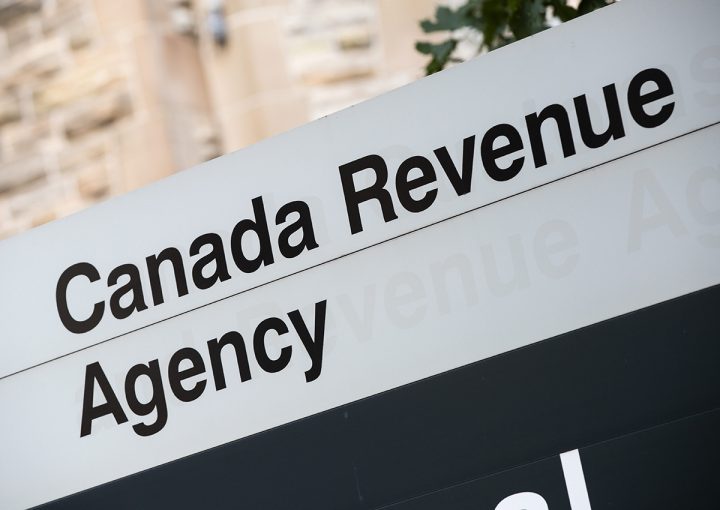Did you know the Canada Revenue Agency can collect your fingerprints? Neither did the rest of us.

The agency had been fingeprinting some Canadians charged with tax evasion on ad-hoc basis for a long time. But sometime last year, it adopted a policy to fingerprint anyone charged with dodging their taxes. And, as of April 1, it will have a system in place to track the number of persons fingerprinted.
There was no formal announcement accompanying the change.
READ MORE: Did you sell your home in 2016? Let the CRA know or else…
“Tax evasion is a serious crime with serious consequences. The CRA is committed to protecting the tax base by ensuring that cases of tax evasion are investigated and, where appropriate, referred to the Public Prosecution Service of Canada,” the agency told Global News in an emailed statement.
Still, all it takes now for someone to be fingerprinted is to be charged, but not necessarily convicted, of tax evasion.
READ MORE: Canadians in the sharing economy are running out of excuses not to pay taxes
What it would take for the CRA to collect your fingerprints
A notice from the CRA saying it believes you cheated on your tax return doesn’t necessarily mean you’ll be fingerprinted. The agency would have to decide to prosecute you for tax evasion.
- Life in the forest: How Stanley Park’s longest resident survived a changing landscape
- ‘They knew’: Victims of sexual abuse by youth leader sue Anglican Church
- Bird flu risk to humans an ‘enormous concern,’ WHO says. Here’s what to know
- Buzz kill? Gen Z less interested in coffee than older Canadians, survey shows
Fingerprinting would occur for “tax evasion offences which may be prosecuted by indictment,” the CRA told Global News.
Indictable offences are things like murder and robbery, which carry the stiffest penalties under Canada’s Criminal Code, as opposed to summary offences, like possessing under 30 grams of marijuana, which come with a much more lenient treatment.
Toronto tax lawyer David Rotfleisch sees the CRA’s approach as problematic, for two reasons.
READ MORE: What the CRA can and can’t do with your data and social media accounts
It’s not uncommon for tax evasion proceedings to end in acquittal
First, said Rotfleisch, “there are plenty of cases where someone accused of tax evasion will be acquitted.”
Of course, the possibility of acquittal exists for anyone charged with a major criminal offence. This isn’t generally seen as a reason for authorities to refrain from fingerprinting those accused of murder or robbery.
But tax evasion is a much more nuanced charge than most serious crimes, said Rotfleisch.
“If you got caught inside a bank with a gun, chances are high you were trying to rob it. If the CRA finds you with $1 million in unexplained assets, there are a number of possible explanations why that may be, besides tax evasion,” Rotfleisch continued.
For example, Rotfleisch said he has handled several cases of wealthy clients from Asia who were accused of tax evasion when all they were guilty of was transferring their savings from their country of origin through money exchange bureaus that didn’t record the transaction as required by law.
The money, now sitting in their Canadian bank accounts, did not match their tax returns, leading the CRA to suspect it was undeclared income.
READ MORE: U.S. sues Vancouver dual citizen for over $1M for not reporting accounts
Even without an acquittal, tax evasion can be treated as a minor offence
The other reason why Rotfleisch questions the CRA’s policy is that even when tax evasion charges are laid, they can be prosecuted either as a major or minor offence.
But the CRA’s approach means you’d get fingerprinted like a bank robber even if prosecutors decided your tax-dodging amounted to something more akin to getting caught with a bit of marijuana.
READ MORE: Self-employed? Here are 6 steps to get your taxes right
Your fingerprint records would be erased only in case of an acquittal
Your fingerprints, taken by agencies like the RCMP and local police, would be recorded in Canada’s national police database at the Canadian Police Information Centre (CPIC).
“If an accused is acquitted on all counts, the CRA will request the fingerprints be removed from the database,” the agency told Global News.
READ MORE: Have a side job? Make sure you’re really bringing in extra money after tax
Fingerprinting would likely imply travel restrictions
The CPIC database is accessible not only to all Canadian police officers but also some foreign law enforcement agencies, including the U.S. Department of Homeland Security and its border protection officers, said Rotfleisch.
That could mean fingerprinted Canadians could potentially face travel restrictions.
“Having your fingerprints on file could prevent you not only from travelling to the U.S., but from flying over U.S. space,” Rotfleisch noted.
And because criminal proceedings can take years, Canadians unfairly accused of tax evasion might be unable to travel abroad for that long, said Rotfleisch.
Even expunging the record after an acquittal can take months, he added.
READ MORE: 12 unusual Canadian tax deductions that filers have tried to claim
It doesn’t necessarily take large sums for the CRA to seek tax evasion charges
While cases in which the CRA seeks tax evasion charges normally involve millions of dollars, Rotfleisch says he’s seen the agency seek prosecution for less than $100,000.
Without formal rules in place, “in theory they could prosecute you because you didn’t know you had to report $1,000 that you made on Airbnb.”
READ MORE: Can’t afford to pay your tax bill? Here’s what you can do




Comments